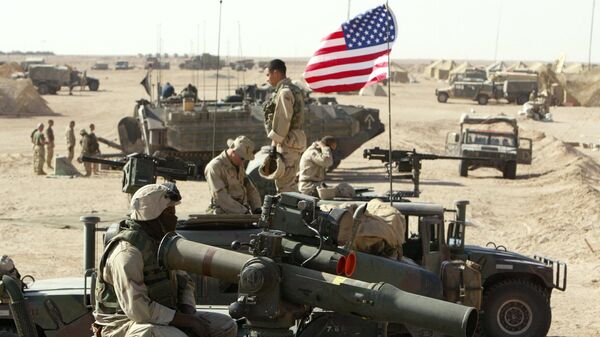Among a tranche of files and minutes published on Friday, December 29, is a secret note omitted from official documents recalling discussions between the then British Foreign Secretary Douglas Hurd and US Secretary of State James Baker on July 17, 1991.
According to the note, both countries were weighing up the possibility of continuing the war against Saddam Hussein after his forces had already been expelled from Kuwait.
The document makes clear the British enthusiasm for joining the Americans in an extension of the conflict, which the US did not want to undertake alone.
Operationally the strikes would be carried out under US command, to which Prime Minister John Major agreed.
The discussions were acknowledged in a secret letter from the Ministry of Defence dated July 12.
'Political Burden-Sharing'
The primary concern of the US, according to the letter, was "the political burden-sharing that would be provided by the inclusion of UK (and French) aircraft," if military action was to continue.
The primary target of the renewed military action, at least officially, was to be Iraqi stocks of presumed nuclear, biological and chemical weapons on the basis that the Iraqis had not yet allowed UN inspectors to determine what stockpiles of biological, chemical and other weapons the country still possessed.
READ MORE: US-Soviet Nuclear War 'Was Possible' in Days After Kennedy's Murder — Historian
Internal discussions within the British Government expose concerns over the logistics of Britain participating in future military action, with the suggestion being made to station fighter-jets at the RAF Akrotiri base in Cyprus, due to overcrowding at the NATO airbase at Incirlik in south-eastern Turkey.
Concerns also existed over the legality of such actions, with the suggestion made in Cabinet papers that a gradually escalating series of aerial attacks on Iraqi infrastructure would be more legally defensible than a one-off shock-and-awe-style assault.
Legal advice which the UK Government received on the matter made clear any such unilateral action would violate the UN Charter and permission had to be granted by the Security Council, which at that time included the Soviet Union as a permanent member.
The Gulf War, often referred to as the First Gulf War commenced on August 2 1990 when Iraq under President Saddam Hussein invaded and occupied the oil emirate of Kuwait.
Kuwait Invasion Was to Rid Iraq of Debts
Kuwait, along with much of the Arab world, European states as well as the US and the Soviet Union had supported Iraq in its war against Iran from 1980 to 1988, but that conflict which killed upwards of a million people on both sides left Iraq close to bankruptcy.
Then in possession of the world's fourth largest military, Iraq attempted to rid itself of part of the nearly US$60 billion debt it owed Kuwait and other Gulf States in the form of loans it had received in the 1980s.
Halabja, city where Saddam killed 5,000 civilians in 1988 chemical attack, has gone on full strike to protest KRG corruption pic.twitter.com/U9eWUOnnMv
— Dâna Nawzar (@DanaNawzar) 27 December 2017
Despite international calls for a negotiated solution, the United States assembled the largest military alliance since World War II and, in conjunction with the United Kingdom, expelled the Iraqis from Kuwait in what they referred to as Operation Desert Storm.
The Ba'athist regime of Saddam Hussein remained in power until the US-led invasion in 2003.
Contrary to the declared justification for the 2003 invasion, it is widely acknowledged that Iraq's stockpiles of WMDs were verifiably declared and destroyed by the UN in the 1990s.
The process of forced displacement and the return of systematic Arabization in the #Kirkuk province is a continuation of Saddam Hussein's regime policy pic.twitter.com/QP705cofAS
— Karwan Salah (@karwansalah) 28 December 2017




